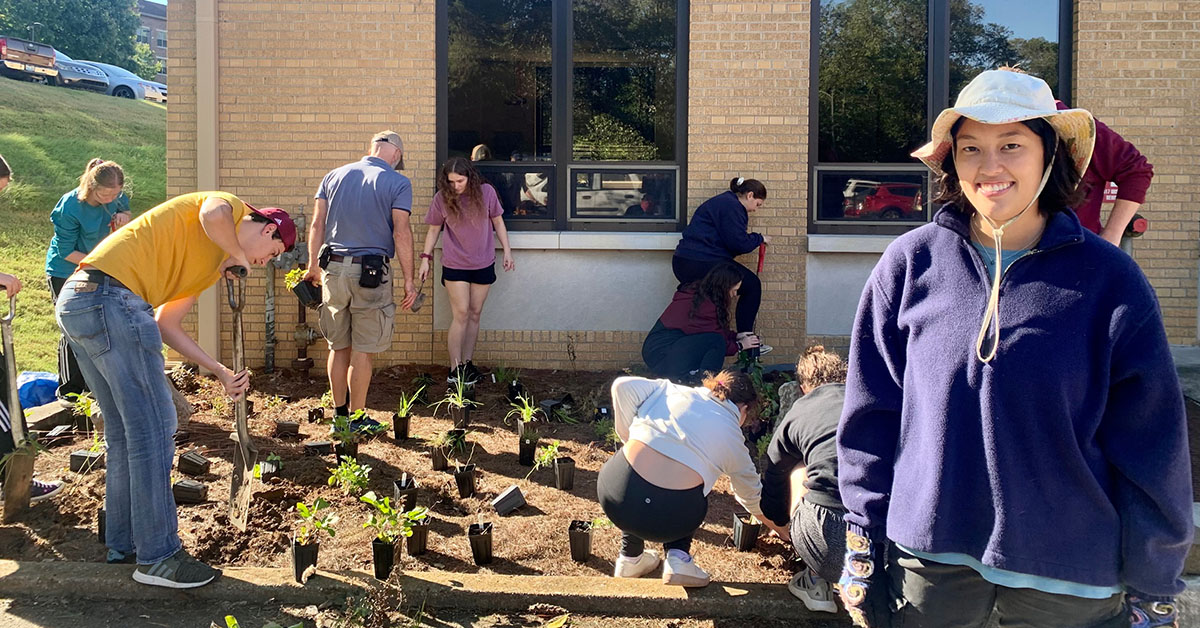
Bellarmine University is now a happier home for butterflies, bees and other pollinators.
Thanks to a grant from the Louisville Zoo, the Bellarmine Beekeeping Club planted a new pollinator garden Oct. 16 on the side of Newman Hall nearest the Merton parking lot. The Department of Environmental Studies is housed in the building and will use it for studies and research.
“We are excited and grateful for this valuable partnership with the Louisville Zoo that has provided the opportunity to install a pollinator garden at Bellarmine,” said Dr. Martha Carlson Mazur, associate professor and chair of the Department of Environmental Studies. “As a living laboratory, the pollinator garden is an excellent learning opportunity for our students and a good way to benefit the environment. Given the global rates of biodiversity loss, college campuses like Bellarmine are prime locations for supporting species diversity, particularly for pollinators that are needed to produce over a third of our food resources.”
In an effort to create additional critical habitat for monarch butterfly conservation and other native pollinators, the Louisville Zoo has become a program partner of the AZA SAFE (Saving Animals From Extinction) North American Monarch butterfly program.
This year, the Zoo created the ‘Monarchs and Milkweed Pollinator Habitat Project’ to help people develop a connection with nature through habitat development and have a direct impact on the conservation of the monarch butterfly.
As part of this program, the Zoo chose Bellarmine and Seven Counties Services to develop pollinator habitats on their campuses. The sites are monarch waystations certified by Monarch Watch and feature milkweed plants.
The leading cause of the population decline of monarch butterflies has been the continuous loss of habitat since the 1960s, with an 80% decline since the 1990s. In the U.S., this is due to the conversion of habitat into agricultural land, the use of herbicides to remove milkweed plants and pesticides to control other insects that destroy agricultural crops. Monarch caterpillars require milkweed plants to feed on in order to complete their life cycle.
“A Monarch Watch Certified pollinator garden is not just a wonderful project from the standpoint of expanding the habitat for important pollinators like bees and butterflies, but it enhances our campus environment and programming, too,” said Dr. Kate Bulinski, associate professor of Environmental Science. “We'll use this pollinator garden for educational purposes for our environmental science courses as well as for student research projects. This is part of a broader effort to make our campus more pollinator-friendly. Additionally, this year we launched a new beekeeping club. We’ll start a few hives this spring at the Bellarmine Farm with plans for planting additional pollinator gardens in the years to come.”
Bellarmine’s Beekeeping Club has about 90 members and meets bi-weekly to educate the community about the art of beekeeping and the ecological value of pollinators.
Hanah Carter, an Environmental Science major who has worked with beehives as a volunteer naturalist at Bernheim Arboretum and Research Forest, is a leader in the group. Alums are donating bees for Bellarmine's new hives, she said.
“It’ll be a nice reciprocal relationship with the bees and the farm,” Carter said. “Working with bees will be a great life skill for students to take from college. The world needs projects like this now. People are looking to make lasting connections with nature.”
